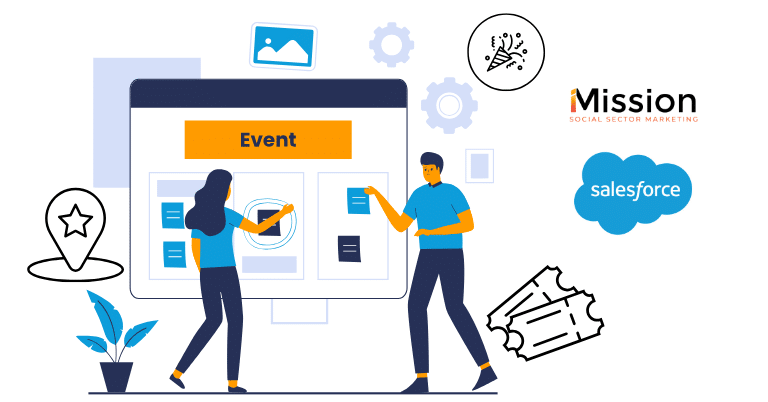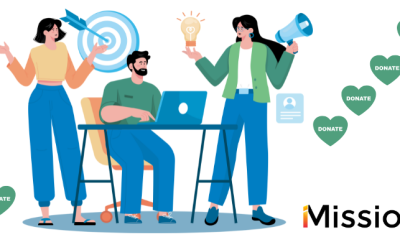What’s the Right Solution for Your Organization?
Nonprofit events, including fundraising galas, conferences, trainings, and golf outings, are essential for the nonprofit effort to build community, educate stakeholders, and raise more money.
While events can be deeply rewarding, they also require substantial coordination at all levels. Today, many teams look to technology for ways to streamline the event management process, and reduce stress before, during, and after.
For event participants, the experience matters just as much as the purpose. Complex registration processes, long check-in lines, or unclear communications can turn an inspiring event into a frustrating one. A thoughtful, streamlined event experience not only reflects well on its organizers, but also strengthens attendee engagement, satisfaction, and support.
Event management applications coupled with Salesforce’s Nonprofit CRM (constituent relationship management system) can solve these issues, and actually do more. The constituent data captured at events inform future fundraising, advocacy and community-building initiatives, making events not just moments of engagement, but powerful drivers of long-term connection and impact In an increasingly data-driven sector, leveraging these event insights is more essential than ever.
The challenge is finding the application that is the right fit for your organization’s needs. There are free event management applications that may meet your basic needs, and others that offer more advanced features to elevate your events, but come at a higher investment..
Some event management applications offer native Salesforce integrations that sync data seamlessly.. Others require API connections or manual imports, which can work well– but only if set up and maintained thoughtfully. The right approach depends on your event attendee volume, your team’s capacity to manage data, and how critical real-time event data in Salesforce is to your overall strategy.
Identifying the right solution for your nonprofit events management means you need to consider a number of factors. This article explores these factors and reviews the pros and cons of selected event applications.

Selecting the Right-Fit Event Applications: Step-by-Step
Step 1: Define Functionality & Features You Need
- What specific features are essential for your events? Think about online registration, ticketing, payment processing, email marketing, event website creation, attendee management, reporting and analytics, fundraising tools (e.g., donation forms, auction management), volunteer management, and check-in capabilities.
- Can the application handle the size and complexity of your events? Consider the number of attendees, types of events (conferences, galas, walks/runs), and any specific needs.
- How does the application integrate with Salesforce?
- Does the application offer mobile capabilities? A mobile app for event check-in, on-site registration, or attendee communication can be a huge plus.
Step 2: Get the Details on Pricing
- What pricing models are offered (e.g., per-event pricing, attendee volume pricing, monthly subscriptions, tiered plans)?
- Are there any transaction fees for online payments or registrations?
- Are there discounts available for nonprofits?
- What are the implementation costs including the Salesforce integration fees?
- Does the application vendor offer implementation, or are you responsible?
Step 3: Evaluate Ease of Use & Support
- Is the application user-friendly and intuitive for both staff and attendees?
- What level of customer support is provided (e.g., phone, email, chat)?
- Are there helpful resources available, such as tutorials, knowledge bases, or online communities?
TIP: Involve key stakeholders in the evaluation process. This might include event staff, fundraising team members, board members, volunteers, and IT staff.
Step 4: Confirm Data Security and Privacy
- How does the application protect sensitive attendee data (e.g., payment information, contact details)?
- Is the application compliant with data privacy regulations (e.g., GDPR, CCPA, Accessibility, HIPAA)?
Step 5: Anticipate Reporting Needs
- What kind of event reports does the application generate? This might include attendee demographics, registration numbers, revenue tracking, and website traffic.
- Can you customize reports to meet your specific needs?
- Can the application help you track the ROI of your events?
Step 6: Check the Vendor Reputation
- Does the vendor have experience working with nonprofits?
- What do other nonprofits say about the application and the vendor? Check online reviews and testimonials.
- Is the vendor financially stable and likely to be around for the long term?
TIP: To make the best decision, it’s highly recommended that you get demos of your top choices. Most vendors offer free trials so that you can test the capabilities before you sign the contract.
Review of Selected Event Management Applications
At iMission, we’ve partnered with numerous nonprofits to support their event management needs. We’ve evaluated a wide range of applications, and 2025, we’ve found ourselves consistently turning to the following solutions, depending on the unique event management needs of our nonprofit clients.
Summit Events
Summit Events Application (SEA) is a free, Salesforce-native application designed to be “lightweight, customizable, and open-source,” making it a popular choice for nonprofits and educational institutions. SEA supports single, recurring, and appointment events, with straightforward installation and implementation. As a Salesforce Commons product, it offers community-driven support through an active and responsive Trailblazer Group.
Highlights
- Free application
- Simple implementation/installation process
- Supports single, recurring, and appointment events
- Part of Salesforce Commons; support available via Trailblazer Group
Challenges
- No direct payment gateway integration; custom code required
- Attendee Registration Interface customization requires CSS knowledge
- Out-of-the-box data schema doesn’t include sponsors, presenters, or other non-attendee types of registrations
Eventbrite Salesforce Integration
The Eventbrite Salesforce Integration connects Eventbrite event data directly with Salesforce, creating an easy way to track registrations, attendance, and engagement in one place. It’s a great choice for organizations that already rely on Eventbrite for external event management.
Highlights
- API integration
- Supports various event types, including virtual and in-person events
- Promotion of events on Eventbrite site and listings
Challenges
- Data sync frequency may not meet real-time needs
- Matching logic can be glitchy and unreliable
- Limited customization options for field mapping without additional development
Soapbox Engage Events
Soapbox Engage offers a suite of apps tailored for nonprofits, including events management. Soapbox Engage supports registrations, ticketing, and payments, with a strong focus on donor engagement and constituent data collection.
Highlights
- API Integrated app
- Comprehensive event management, including ticketing and payments
- Offers a suite of related apps (donations, petitions) to enhance engagement
- Flexible framework to build out courses and classes, as well as events
- Robust support center with free and paid support offerings
Challenges
- Budget considerations come into play based on usage levels and customization requirements
- Some self-configuration generally required for tailored data syncing with Salesforce
Blackthorn Events
Blackthorn Events is a Salesforce-native solution that offers flexible event management for a range of event types. It’s well-suited for organizations hosting multiple event formats, such as conferences, galas, and webinars. Blackthorn also provides additional products like Payments, Messaging, and Store, allowing for a more integrated approach to event and engagement management. Its mobile check-in app streamlines onsite experiences for internal users and attendees alike.
Highlights
- Salesforce-native app
- Mobile check-in app for staff and a mobile event app for attendees
- Additional products available for payments, messaging, and online stores
- Guided and personalized onboarding
- Extensive documentation and responsive support team, with free and paid support options
Challenges
- Complex data model that may require training for new users
- Licensed application with cost based on users and total registrations
- May include features beyond the needed scope of smaller events, which could lead to underutilization without clear implementation goals
Do you have any questions about any of these tips, highlights, or challenges?



